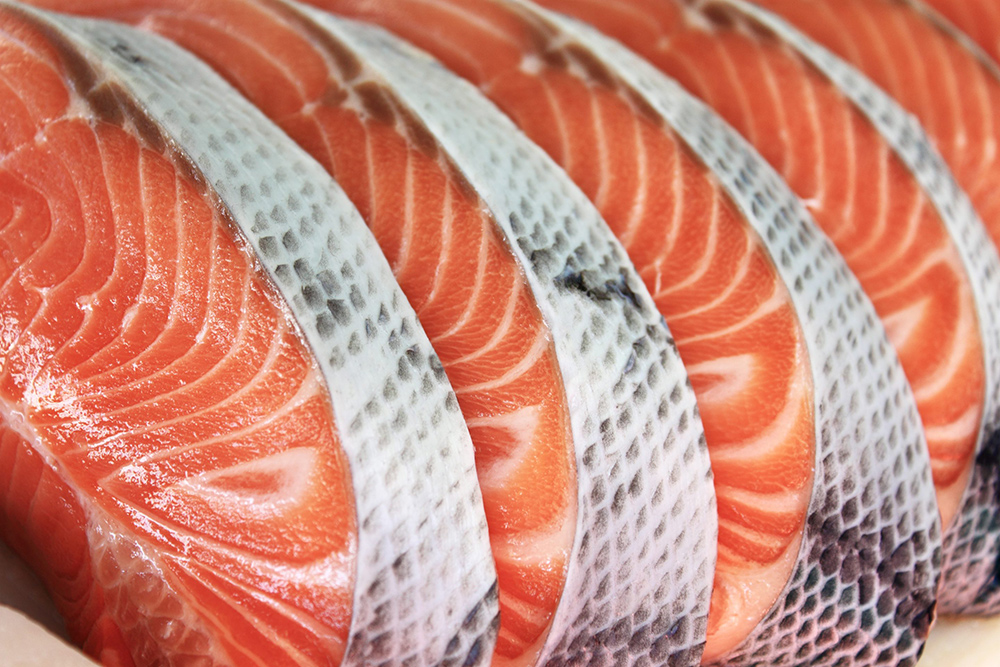
從生物化學(xué)方面解釋飲食對大腦健康的影響,可以歸結(jié)于腸道。
內(nèi)科醫(yī)生,、Big Bold Health的科學(xué)與臨床創(chuàng)新高級總監(jiān)奧斯汀·珀?duì)栺R特說:“我們越來越多地了解到,腸道包括腸道菌群的健康,與大腦健康密切相關(guān),?!蹦c道菌群由在人體胃腸道中生存的數(shù)以萬億計(jì)的微生物組成,它們會與我們消化的營養(yǎng)物質(zhì)發(fā)生反應(yīng),。
專家指出,,腸道以免疫信號的形式發(fā)出的信息,能夠通過迷走神經(jīng)發(fā)送給大腦,。珀?duì)栺R特表示,,飲食會影響這些免疫信號,而我們的腸道和攝入的食物可以對這些信號進(jìn)行“訓(xùn)練”或“編程”,。
飲食可能導(dǎo)致腸道菌群失衡,,進(jìn)而引發(fā)炎癥。研究發(fā)現(xiàn),,炎癥會對情緒產(chǎn)生負(fù)面影響,,引發(fā)與焦慮相關(guān)的心理健康問題。對動物開展的其他初步研究顯示,,腸道變化會影響大腦健康,,包括增加患阿爾茨海默癥和抑郁癥的風(fēng)險(xiǎn)。
珀?duì)栺R特稱:“如果你知道腸道內(nèi)有數(shù)以萬億計(jì)的細(xì)菌,,你正在攝入各種不同的食物分子,,它們會影響你的免疫系統(tǒng),你就會意識到,,你每天在腸道中攝入的食物正在塑造你的身體,。你會開始明白,你吃的食物,,也就是你向腸道發(fā)送的信息,,會直接影響大腦功能?!?/p>
雖然沒有一種通用的飲食能夠改善精神健康,,但有些建議可以幫助你通過腸道攝入的食物,優(yōu)先考慮大腦健康,,這些建議包括你能夠攝入哪些食物,。
食物多樣化
食品加工公司ADM的醫(yī)學(xué)事務(wù)與臨床開發(fā)副總裁理查德·戴博士表示,雖然還需要開展更多研究才可以確定“健康菌群”的意義,,但“多樣化菌群”似乎最接近于健康菌群,。
戴指出:“大量攝入不同植物纖維,為多樣化菌群的誕生奠定了基礎(chǔ),?!?/p>
在《美國臨床營養(yǎng)學(xué)雜志》(American Journal of Clinical Nutrition)上發(fā)表的一篇研究論文認(rèn)為,,攝入包含八種主要食物種類的飲食,包括蔬菜,、水果,、海鮮和堅(jiān)果等,有益于體內(nèi)菌群和腸道的總體健康,。
魚類
《情感障礙雜志》(Journal of Affective Disorders)于2016年發(fā)表的一篇論文稱,,攝入富含魚類和歐米伽-3脂肪酸的飲食,能夠降低抑郁風(fēng)險(xiǎn),。
珀?duì)栺R特建議食用小型冷水魚類,,例如三文魚、鯖魚,、鳀魚,、沙丁魚、鯡魚(合稱為“SMASH”)等,。
魚類是地中海飲食的主要組成部分之一,,對精神健康具有積極影響。地中海飲食以植物類天然食品,、魚類,、蔬菜和健康脂肪為主。
富含多酚的食物
多酚是一種微量元素,,常見于綠葉蔬菜和接骨木梅,、藍(lán)莓等五顏六色的水果當(dāng)中,可能有益于大腦健康,。
珀?duì)栺R特說:“多酚的效果之一是作為益生菌,,可以對菌群產(chǎn)生積極影響。當(dāng)我們攝入多酚時,,它們能夠在一定程度上抑制不健康細(xì)菌的生長,。”
富含纖維的食物
事實(shí)證明,,富含纖維的食物也有益于腸道菌群,,可以影響免疫系統(tǒng)。攝入纖維能夠產(chǎn)生短鏈脂肪酸,,對人體有許多益處,。
珀?duì)栺R特表示:“短鏈脂肪酸可以影響人體免疫系統(tǒng),但有人認(rèn)為它們可能進(jìn)入大腦,,進(jìn)而影響大腦功能,。它們可能還有消炎效果?!?/p>
飲食中可以包括全谷物,、豆類、堅(jiān)果,、洋姜,、蒲公英葉、大蒜和洋蔥等食物,。
珀?duì)栺R特說:“我們依舊需要進(jìn)行更多研究,,了解哪些類型的菌群干預(yù)對人體是有益的。但如今有數(shù)以千萬計(jì)的人患有臨床憂郁癥,,有更多人正在努力改善情緒,,因此人們迫切需要針對情緒問題找到新的解決方案,而腸道可能就是解決方案之一,?!保ㄘ?cái)富中文網(wǎng))
譯者:劉進(jìn)龍
審校:汪皓
從生物化學(xué)方面解釋飲食對大腦健康的影響,可以歸結(jié)于腸道,。
內(nèi)科醫(yī)生,、Big Bold Health的科學(xué)與臨床創(chuàng)新高級總監(jiān)奧斯汀·珀?duì)栺R特說:“我們越來越多地了解到,腸道包括腸道菌群的健康,,與大腦健康密切相關(guān),。”腸道菌群由在人體胃腸道中生存的數(shù)以萬億計(jì)的微生物組成,,它們會與我們消化的營養(yǎng)物質(zhì)發(fā)生反應(yīng),。
專家指出,腸道以免疫信號的形式發(fā)出的信息,,能夠通過迷走神經(jīng)發(fā)送給大腦,。珀?duì)栺R特表示,飲食會影響這些免疫信號,,而我們的腸道和攝入的食物可以對這些信號進(jìn)行“訓(xùn)練”或“編程”,。
飲食可能導(dǎo)致腸道菌群失衡,進(jìn)而引發(fā)炎癥,。研究發(fā)現(xiàn),,炎癥會對情緒產(chǎn)生負(fù)面影響,引發(fā)與焦慮相關(guān)的心理健康問題,。對動物開展的其他初步研究顯示,,腸道變化會影響大腦健康,包括增加患阿爾茨海默癥和抑郁癥的風(fēng)險(xiǎn),。
珀?duì)栺R特稱:“如果你知道腸道內(nèi)有數(shù)以萬億計(jì)的細(xì)菌,,你正在攝入各種不同的食物分子,它們會影響你的免疫系統(tǒng),,你就會意識到,,你每天在腸道中攝入的食物正在塑造你的身體,。你會開始明白,你吃的食物,,也就是你向腸道發(fā)送的信息,,會直接影響大腦功能?!?/p>
雖然沒有一種通用的飲食能夠改善精神健康,,但有些建議可以幫助你通過腸道攝入的食物,優(yōu)先考慮大腦健康,,這些建議包括你能夠攝入哪些食物,。
食物多樣化
食品加工公司ADM的醫(yī)學(xué)事務(wù)與臨床開發(fā)副總裁理查德·戴博士表示,雖然還需要開展更多研究才可以確定“健康菌群”的意義,,但“多樣化菌群”似乎最接近于健康菌群,。
戴指出:“大量攝入不同植物纖維,為多樣化菌群的誕生奠定了基礎(chǔ),?!?/p>
在《美國臨床營養(yǎng)學(xué)雜志》(American Journal of Clinical Nutrition)上發(fā)表的一篇研究論文認(rèn)為,攝入包含八種主要食物種類的飲食,,包括蔬菜,、水果、海鮮和堅(jiān)果等,,有益于體內(nèi)菌群和腸道的總體健康,。
魚類
《情感障礙雜志》(Journal of Affective Disorders)于2016年發(fā)表的一篇論文稱,攝入富含魚類和歐米伽-3脂肪酸的飲食,,能夠降低抑郁風(fēng)險(xiǎn),。
珀?duì)栺R特建議食用小型冷水魚類,例如三文魚,、鯖魚,、鳀魚、沙丁魚,、鯡魚(合稱為“SMASH”)等,。
魚類是地中海飲食的主要組成部分之一,對精神健康具有積極影響,。地中海飲食以植物類天然食品,、魚類、蔬菜和健康脂肪為主,。
富含多酚的食物
多酚是一種微量元素,,常見于綠葉蔬菜和接骨木梅、藍(lán)莓等五顏六色的水果當(dāng)中,,可能有益于大腦健康,。
珀?duì)栺R特說:“多酚的效果之一是作為益生菌,,可以對菌群產(chǎn)生積極影響。當(dāng)我們攝入多酚時,,它們能夠在一定程度上抑制不健康細(xì)菌的生長,。”
富含纖維的食物
事實(shí)證明,,富含纖維的食物也有益于腸道菌群,可以影響免疫系統(tǒng),。攝入纖維能夠產(chǎn)生短鏈脂肪酸,,對人體有許多益處。
珀?duì)栺R特表示:“短鏈脂肪酸可以影響人體免疫系統(tǒng),,但有人認(rèn)為它們可能進(jìn)入大腦,,進(jìn)而影響大腦功能。它們可能還有消炎效果,?!?/p>
飲食中可以包括全谷物、豆類,、堅(jiān)果,、洋姜、蒲公英葉,、大蒜和洋蔥等食物,。
珀?duì)栺R特說:“我們依舊需要進(jìn)行更多研究,了解哪些類型的菌群干預(yù)對人體是有益的,。但如今有數(shù)以千萬計(jì)的人患有臨床憂郁癥,,有更多人正在努力改善情緒,因此人們迫切需要針對情緒問題找到新的解決方案,,而腸道可能就是解決方案之一,。”(財(cái)富中文網(wǎng))
譯者:劉進(jìn)龍
審校:汪皓
There’s a biochemical explanation for why diet may affect brain health, and it comes back to the gut.
“We’re increasingly learning that the health of the gut—so that includes the gut microbiome—is closely linked to the health of our brains,” says Austin Perlmutter, a doctor of internal medicine and senior director of science and clinical innovation at Big Bold Health. The gut microbiome is made up of trillions of microorganisms living in our gastrointestinal tract that interact with the nutrients we digest.
Experts note that messages from the gut, in the form of immune signals, can be sent to the brain through the vagus nerve. Diet can affect those signals, which can be “trained” or “programmed” by our gut and, therefore, what we eat, Perlmutter says.
Diet can cause an imbalance of bacteria in the gut, which is associated with inflammation. Studies show that inflammation can negatively affect mood and lead to anxiety-related mental health problems. Other preliminary studies in animals show that changes in the gut affect brain health, including increasing the risk of Alzheimer’s disease and depression.
“If you think about the fact that you have trillions of bacteria in your gut, that you’re taking in all of these different food molecules, and that your immune system is there, you realize that every day all of the input that goes into your gut is shaping your body,” Perlmutter says. “You can start to appreciate that the foods that you eat, the information coming into your gut, has a direct effect on your brain function.”
While there is no one-size-fits-all diet that can improve mental health, there are some tips you can follow—including which food groups to eat—in order to prioritize your brain health through what you feed your gut.
Overall food diversity
While more research is needed to define what it means to have a “healthy microbiome,” a “diverse microbiome” seems to be the closest fit, says Dr. Richard Day, vice president of medical affairs and clinical development at ADM, a food processing company.
“By consuming a large number of different plant fibers, that gives the building blocks for the emergence of diverse bacterial populations,” Day says.
In a study published in the American Journal of Clinical Nutrition, maintaining a diet in eight main food groups, including vegetables, fruits, seafood, and nuts among others, benefited a person’s overall microbiome and gut health.
Fish
Consuming a diet rich in fish and omega-3 fatty acids was associated with a lower risk for depression, according to a 2016 study published in the Journal of Affective Disorders.
Perlmutter recommends eating small, cold-water fish like salmon, mackerel, anchovies, sardines, and herring (also known as SMASH).
Fish are a big part of the Mediterranean diet, which has been linked to positive mental health outcomes. The diet is a way of eating that focuses on plant-based whole foods, fish, vegetables, and healthy fats.
Foods rich in polyphenols
Polyphenols are micronutrients most commonly found in plants, including leafy greens and colorful fruits, like elderberries and blueberries, and can be a positive for brain health.
“One of the things they do is they act as probiotics, so they can positively influence the microbiome,” Perlmutter says. “When we consume polyphenols, they can kind of suppress the growth of unhealthy bugs.”
Foods rich in fiber
High-fiber foods are also shown to have positive effects on the gut microbiome, which affects the immune system. Consuming fiber produces short-chain fatty acids, which benefit the body in a myriad of ways.
“These short-chain fatty acids can influence our immune system, but it’s also thought that they can get into our brains and influence our brain function,” Perlmutter says. “They may have an anti-inflammatory effect.”
Consider incorporating whole grains, beans, nuts, Jerusalem artichokes, dandelion greens, garlic, and onions into your diet.
“We still need to know a lot more about what types of microbiome interventions may make sense for individuals,” Perlmutter says. “But in an age where hundreds of millions of people have clinical depression, and many more are struggling to improve mood, there is absolutely a pressing need to find new solutions for mood issues, and the gut may offer that.”






